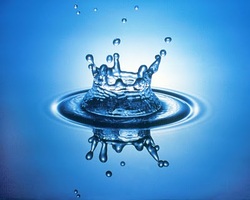 Really, one could go on and on about how dreadful the state of the world is and how we're all going to suffer the fate of our own absolution. But there's really no point in labouring a point. Better to get on with the next exciting chapter of life and see what it has in store. Out there in the great scheme of What Is, there are some fun times to be had. So why not throw a pebble in the water? The crowning glory of every day is surely the realisation that we are here, now, with an opportunity to learn more tomorrow based on what we found this side of sunrise. For me, every day is cherry-topped by the realisation that the hunt for Dark Matter has taken humankind into universal territory which could explain a lot of things about the way we think. There are two kinds of matter, they say. Ordinary, and Dark. These two kinds of matter have a difference most stark. One of them you cannot see, bathed in invisibility The other one's in front of you, it's red and green and white and blue. 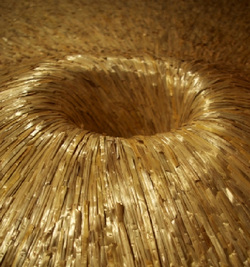 Well, there's a thing. Two very different kinds of matter. One plain as day, there in our face all the time. The other, totally invisible, we don't know what it's made of or what it might be like at all. All we know is that it's there and it probably makes up around 75% of the Universe. Only, it's not here, it's out there. The current question posed by scientists, to scientists, is, "Can we make Dark Matter in the lab?" Shea Hembrey is a sculptor who's taken a plunge to make Dark Matter through his own artwork, an example of which is pictured. His exhibition, Dark Matters, is on view at the Bryce Wolkowitz Gallery. Nature and mankind have had an uneasy relationship since the discovery of gold and its sacred form as wealth. Like a little lost W particle, Wealth sits close to Health on the one hand, and Stealth on the other. While all the Universe out there is filled up with Dark Matter Scientists are watching precious cosmo-constants shatter The Higgs came out of knowhere bringing SUSY to her knees Now new Dark Matter candidates are swarming round like bees 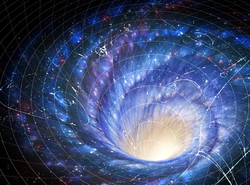 Supersymmetry, many have mournfully declared, is dead. SUSY is no more. Like the Monty Python Parrot Sketch, she is deceased yet still her existence is earnestly defended. This fiasco will probably go on for some time. Be amused. Be even more amused by the candidates trotting out of the Particle Zoo at the heels of their faithful champions. Earnest competitors for the title of Dark Matter Discoverer are lifting to the show bench everything from WIMPs to things like gravitons which have yet to be defined by theoretical or experimental analysis. Here's Andrew Handley's marvellous collective of peculiar particles. When you turn off the lights tonight, and lie down to sleep in your cosy bed in the familiarity of your bedroom, spare a thought for the fact that you can't see your bedroom any more. You can't see what's downstairs, or outside, or anywhere, in fact, unless there's light shining on it and your eyes are there to soak up the photons.
Don't worry, put your trust in the scientists. Dark Matter is out there, making up 75% of the known Universe. But it's not in here, inside Earth's atmosphere, even though the atmosphere is invisible by night when there's no light from the Sun to make it blue. Dark Matter will have to be made in the lab if it's to find its way to Earth. So it won't be in your bedroom. Sweet dreams.
0 Comments
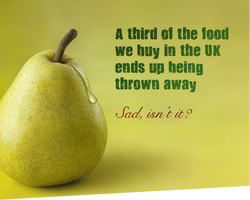 While this is all happening, we're still eating our fish and chips. Billions are thrown away uneaten, as Tesco have kindly revealed. What strikes me is that we don't see any news coverage of any of these global cat-ass-trophies but we see plenty of action involving people killing each other outright. As if killing each other outright is somehow more newsworthy than killing the entire planet by stealth. Type "Wasted Fish Thrown Back" into Google Images and you'll get a lot of pretty pictures but nothing of what the carnage really looks like. < check the pic) It may well be no coincidence that all this is getting exponentially worse while populations are being kept in the dark. Possibly Fermi was right and we all head for self-destruct in line with Fermi's Paradox. What puzzles me more is the synchronous element with our digging around in Dark Matter. For perhaps in Dark Matter is the fabric of consciousness and we've been busily ignoring it for some time now. 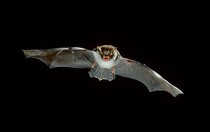 Wealth is seen as a goal by all of us. We want more. Every time we step into a supermarket we are buying what we want, not what we need. Maybe too deep for a Monday evening, but we're the product of an increasingly wealthy and selfish society and we're not being subjected to any vision of what we are collectively doing to the world. We have to go looking for those pieces of information - they rarely make the front page, let alone the stage. The news is put together to entertain us and if it doesn't press the required shirt buttons it finds itself tangled up its own premonitions. 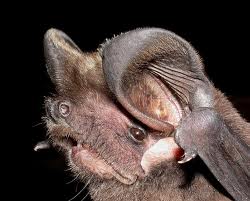 Everything dies. Absolutely everything dies. The blood is the life, they say, linking vampires with bats. Bloodsucking loathesome black creatures that flit and swoop and get tangled in things too close for comfort. Unless you like bats, in which case you've probably met one. In addition to being a scapegoat for scariness, bats spend their whole lives upside down. They live and die upside down. When they die, blood rushes to their head wherever they are, whatever they're doing (unless they get killed by something else). Perhaps that is a comfortable way to die, and bats evolved from something knowing that being upside down would be a comfortable way to die. What is it about bats we dislike so much? Ask this one. 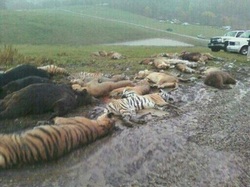 We have to go to sleep now. We have no choice but to live out our dreams in our worlds where the scariest things are being looked after by people with guns, and sit in our burrows chewing. Lying down to sleep every night safe against the threats our politicians and malitary people are making promises to keep safely away somewhere else. Not here, in our bedroom, no. We're safe here, fed and happy, maybe a little drunk. Waiting. Waiting for change. Money rhymes with honey - all other rhymes aren't spelt the same. Those who fail to study history are condemned to repeat it. Winston Churchill 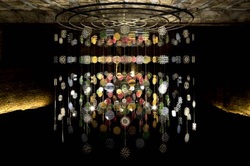 Yesterday I took a train to London to visit the Superposition Exhibition at the Canal Museum. The experience was interesting, eventful and enlightening. This project is a blend of art and science which is aimed at exposing the underbelly of physics to the world at large, in order to negate some of the fear which seems to follow this particular science around. "Say to someone, 'that's physics', and they run a mile," said one of the contributors. The project was engineered by the Institute of Physics - I learned during the discussion session later that CERN even has artists on-site full-time to engage with scientists. So the blend of mind-sets is clearly considered to be of some worth. The online flyer asks and answers an intriguing question: Why is this show called Superposition?' Superposition' is a physics concept describing two different phenomena:
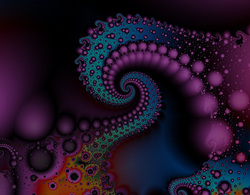 The question begged by the image here (click on it for a link to its originator) is, "Fractal Art or Quantum Physics?", from an article written in 2009. Fusion of art and quantum activity is therefore nothing new, although it could be said to be an emerging trend which has got a lot of people and organisations interested in the implications of such collaborations. Myself included... I asked a couple of questions at the audience-participation session which others in the audience also asked in different ways. Where is this collaboration going? Does it signify the dawn of a new destiny for physics, where artisan imagery is dovetailed with equations? Are the old constraints and constants heading for the door, in the wake of opportunities to expand the world view? There was an awkward silence. It seems that with all the best intentions of unexpected consequences, the marriage of art and science has been carefully arranged but true love is a little harder to husband. Each time the question of deeper collaboration was posed directly, the answer veered off to concentrate on the artwork itself or the physics itself, rather than a future for the two together. Truly, Ben Still and Lyndall Phelps, scientist and sculptor who'd put this show on the road, seemed comfortable about their joint venture and committed to furthering it with future projects. But there was space for genuine excitement about sowing a seed which would lead to lusher harvest than dust-dry formulas from the academic table and whimsical imagery from the artist's studio. A space which, after a full month of these discussion sessions, Ben and Lyndall still struggled to fill. 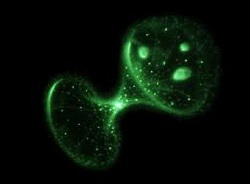 This is not a prescience of doom and gloom, but a realistic call for questions to generate the energy physics needs if it truly wants to engage with the public and capitalise on opportunities the quantum world is throwing in its direction. Quantum is a sexy word. Product manufacturers and film-makers who want to get ahead are jumping all over it. Quantum has sexy implications - we can multi-task on a whole new level if we really get to grips with superposition. Physics has a choice - to stick on a hand of familiar formulas and pre-moulded mathematics, or cash in some of its chips in exchange for a path of uncertainty and oscillation. Quite clearly the neutrino would lean towards the latter, probably agreeing with the artist in so doing. At this moment in current spacetime the two camps in the relationship seem equally uncertain of each other.  Money is the root of all evil, they say. Well, not all of it, maybe. There are some nefarious acts which aren't motivated by money, and some money which is put to great uses. But the question is valid on a global scale because we're all part of the answer, and all have a right to answers. The Universe expects us to answer simple questions so that it can progress us to the next level, but right now we are stuck on this round, and appear to be rapidly devolving. This Blog has been thrust into existence by a few synchronous events of the past few days. A tweet from 815wrldtrvlr was one of them; "The wealthiest and most powerful are corporations, and they've too much to lose," in response to a question of whether we as a species are likely to come to our senses in time. Another was a story I heard from someone (who must remain anonymous) of a first-hand recalled event. This person, who I'll call Hermione, was working for a charity devoted to the environment. Over 70% of their income goes directly into conservation. A couple approached as she manned her stand at a local show in Gloucestershire, and the wife seemed enthusiastic, debating with husband in a pseudo-poshivist voice. "Oh dahling, I so want to support this. Such a good cause. But where shall we join? I mean, we're not here awften, are we? There's the London base, of course, but to be honest we're not there that awften either, are we?" "No, dear," nodded her husband. "What about Scotland, then? We spend more and more time in Scotland these days, don't we?" "Yes, dear." "Wonderful. That's settled then, we'll sign up to the Scottish region." She smiled at Hermione. "How much did you say the minimum was?" Hermione had explained the membership system, which relied on a voluntary monthly donation, and that the minimum of £4 covered basic administration costs such as a quarterly magazine and other material they would receive. She replied dutifully to the lady's question. "Is that alright, dear?" the lady asked her husband. "Oh yes, £4 a month is fine. Absolutely." Hermione gathered the form onto a clipboard for them to sign. When the details had been filled in, she explained about the GiftAid signature, which enabled the charity to claim 25p from the Treasury for every £1 donated by taxpayers. "Oh, we're nawt taxpayers," exclaimed the lady. "No, no, we can't GiftAid it, I'm afraid." When they had gone, Hermione was joined by a co-worker who had been standing nearby. "Let's have a look at the form," he asked. She handed it to him. "That Scottish address," he said. "That's not an address, it's an island!" The couple turned out to be owners of a major retail corporation in the UK. They owned an island, dwellings in London and Gloucestershire, and probably a few others elsewhere too. But they didn't pay tax, and couldn't bring themselves to contribute anything of significance to a charity devoted to worthwhile work which they themselves had chosen to support. I found the story remarkable and very disconcerting, but recognised the epitomy of truth within it. I've encountered a great deal of evidence to suggest that the wealthier a person becomes, the more protective of their treasure trove they get.  This means that the bulk of financial reserves on the planet are in the hands of people unwilling to part with it. No matter how deep the stranglehold gets, they seem unlikely to take their heads out of the sand and put fiscal energy into projects which will protect the earth and secure its future. They are more likely to continue buying lobster thermidor and mahogany furniture. Even those who should really be more enlightened appear to be falling into the avarice pit. Joe Vitali, who made his fame on The Secret, reveals that what he has done with the wealth attained from teaching people how to live better lives through communing with the Universe is to buy himself a mansion and twelve cars. Everywhere you find a Law of Attraction guru, you're likely to find someone who has the power to make a difference, but chooses not to. Science tells us that we are all connected, we are all sharing the same universal energy. Water has memory - there is no shortage of water, but it cycles the Earth within the confines of the atmosphere. The H2O molecules in your bath may once have coursed down the Amazon. Take a look at this 2 minute video from research in Germany. Water connects us to what is going on, making us aware of planetary truth (even though the media would like our perception of truth to be selective).
We know, we understand, we share the consequences. I've no idea how far it'll get us. Who cares? 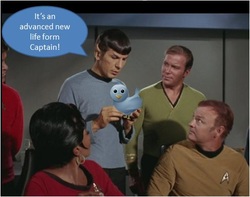 Science fiction relies heavily on other life forms. Without them, there would be few stories worth telling. In the main, alien life forms speak American English and fall into two camps - nice and nasty. They're either after our blood for entertainment, food, or territorial gain, or they're ambivalent, peace-driven and self-contained. Nasty ones can be terribly advanced technologically, but they've generally stolen everything they have from other civilisations and don't have much going for them in the way of intellect. Here the cast of Star Trek have discovered that Twitter is a life form in its own right. I'm pleased to confirm it to be a pleasing companion with a decent level of intellect and a dandy sense of humour. Seriously though, what is 'advanced'? Science claims future-borne time waves to be 'advanced'. Science fiction points us firmly in the same direction. Life which has time to evolve beyond warmongering, waste, wanton destruction and wardrobe fetish generally qualifies. Telepathic communication is a common denominator. Ability to interact with the environment empathically and to use resources (including quantum resources) wisely without turning in on themselves is essential for a higher form of life. A strong sense of self-belief and a determination to promote positive ethics are also indicative of advancement. 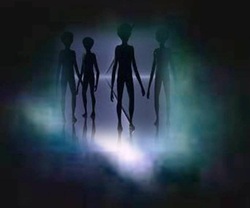 Whatever the truth about aliens in relation to this planet (I guess speculation will continue for some time) we have surely to consider whether we qualify as Advanced, or whether like the Goa'uld we are simply buying into our own self-made publicity. It's easy to think you're more advanced than another life form when you can apparently do more things, have more ideas, create more inventions, destroy more easily. The Nox would tell us that these things are only useful when you have a deep understanding of your place in the greater scheme and a sense of reverence for your own fragility. We as life forms are probably teetering on the brink of being lost without trace in a cosmos which doesn't care whether or not we survive, or ascending to a state of being which does understand its place in the scheme of things and is prepared to make changes to save itself from self-destruct. So where are we now? Advanced or understudied? We might have a lot more to learn about ourselves before we can fruitfully make changes of significance. We have to stop feeding ourselves into morbidity and wean ourselves off the constant supply of purchases thrust at us in pursuit of the false god Money. Money rhymes with Honey - in this land of milk and money we are doomed to continue stripping our planet and recklessly careering over the precipice of social putrefaction.
We're not going to be much good to anyone if we do that. And having scuppered our chances of evolution, we certainly won't be able to count ourselves as Advanced. 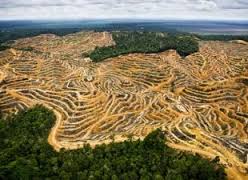 This Blog comes with a health warning. What you are about to read in the first link is an attempt to salve part of your conscience in exchange for a cup of 'shade-grown' coffee. If you look up "coffee rainforest destruction" on your server it'll give you lots of tips from experts and charities encouraging you to change from the super-destructive 400 billion cups of coffee drunk every year to a more environmentally friendly version so that the 400 billion cups a year consumed will slow down the supermassive onslaught on your source of oxygen. This one comes top of the list on Google: Here's the ad... How Coffee Aids in Deforestation of Our Rainforests Take a minute to read the Blog at Quantumology - not this one, the other one. We're up to our necks in dark matter, fighting an enemy we can't see. Darth Vader will be having a field day. We, on the other hand, are heading straight for self-destruct on a very fast trajectory, powered by an energy we've only just discovered. It's dark. We've been talking about it for years. Millions of years, probably. At no time in history have we ever been so close to meeting it face to face. 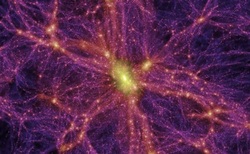 Just look at this stuff. Beautiful, isn't it? Dark Matter and energy may be so elusive because maybe they don't actually belong in the world of physics. Perhaps they belong to metaphysics, where singularities break down and the electron becomes a mythical beast we can't identify. This, like all other images of dark matter available at present, is a simulation. Researchers know what DM looks like in spacetime because of the effect it has on light, a subtle knife that can be twisted to advantage. Whether or not we belong to the bond of academic Universe researchers, we're out here on the edge of planetary catastrophe wondering what to do about it. Does this have any bearing on us at all? We've got enough evidence to piece together that dark and light are two sides of a coin and we have access to both in all formats - spiritually, visually, scientifically etc. Science has it that there's an awful lot of dark stuff out there, but it's invisible because it "doesn't interact with light." Of course it interacts with light, just as positive and negative currents interact with each other. I get so tired of the silly constraints scientists seem to frenziedly scrabble for, because the theory has to match the experiment and if you can't do an experiment (albeit in quantum that's pretty hard, because the bits are too small to see) you have to match it with the math. Different science needs different tools. Minds, waves, particles, brains = any connection??? 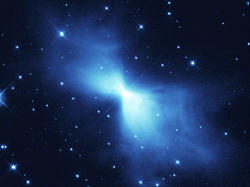 Clearly the Universe has no interest in our historically plunged constants, it wants to evolve. We are right on the brink - evolve or die. Get it or stuff it, there's no-one to help you. We ran out of bullocks and shekels of silver a long time ago, but there's no-one to run out of patience with us, any more than there was when somebody wrote the Old Testament. God kept on forgiving, saying it was okay to do it all over again, and left us to go out and spoil each other's tents - again. The Universe has time to do it all again, build a new life-form on a planet which is capable of bonding the world inside itself with the one it lives on. The Universe makes gold, but doesn't make anybody value it against the Sun. Oh Lucifer, Son of the Morning, How Thou Art Fallen. This is a real photograph of the Boomerang Nebula, discovered in 1998. Good year for the roses. 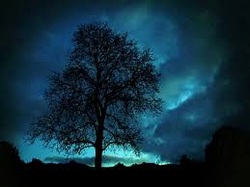 Something randomly occurred to me on the drive home just now. What makes constants make no sense? If change is happening all the time, just what is constant? There has to be a bedrock to the universal continuum of change, something that underpins evolution in favour of some random collective of meaningless, disconnected entities. Driving past the trees, those trees choose to be there as I choose to be driving past them. They may not choose exactly where their seed sprang to life in the soil, but they choose to survive against the challenges nature throws at them. We know enough about trees to accept their sentient position - they feel fear, they feel pain, they scream when attacked by chainsaws. They might not have a brain as we know a brain to be but they are very much alive. What if conscious choice is the only constant in the Universe? Think of what we choose to be there - roads, houses, cities, infrastructures, our children, our friends, our food. Things we don't choose are those things beyond our control, and sometimes that line gets very blurred when it comes to lifestyles, relationships and career events. We do invite certain repetitions in life and our behaviour creates blueprints for effects we've no idea we caused. So, some things we consciously choose, some we subconsciously choose. Ok. So what's left? 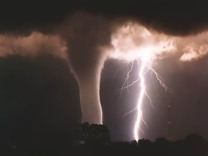 The things we ultimately have no control over whatsoever are loosely termed "Acts of God". This covers everything way beyond the boundary of our personal environment and is most often assigned to a catastrophe. But the things that happen out there in the Universe at large fall into this "Act of God" category too, and there are some very beautiful happenings going on. Creation and destruction seem to be part of a cycle and the part we play is very, very small. Even if we were to systematically strip the Earth of everything she has to offer, which we might well do if we're not careful, the Universe has plenty of other options in its quest to evolve life. And plenty of time to evolve it in. If we miss our boat, that's our problem. In science, constants are chased mercilessly in attempts to make the formulas fit the reality. Planck's constant, the speed of light, supersymmetry, all these and many more rigidities have made their way into scientific processing. This is a matter of choice, borne of a reliance on mathematics to unravel mysteries still locked tightly into universal coils. We're free to choose how to look at things, and when we change our point of view our world has a habit of changing with it. If that's the only constant we can rely on to be there, perhaps it's time we used it to advantage instead of persecuting our planet while scrabbling for the spoils of self-pity, dread, loathing and fear. |
AuthorKathy is the author of Quantumology. She met up with quantum mechanics in 1997, pledging allegiance to its sources thereafter. These are her personal thoughts and testimonies. Archives
April 2023
|
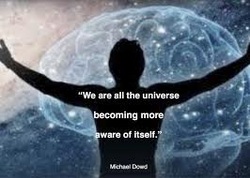
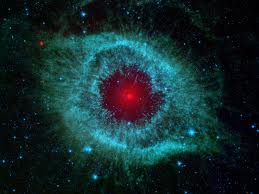
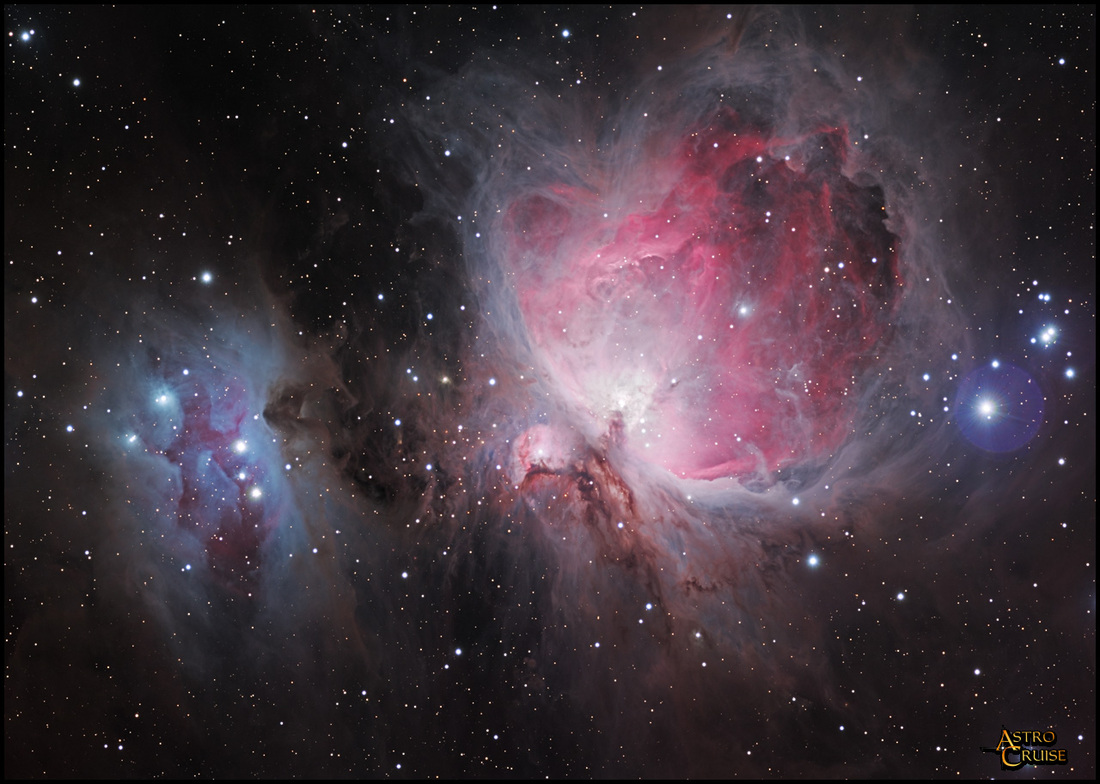
 RSS Feed
RSS Feed